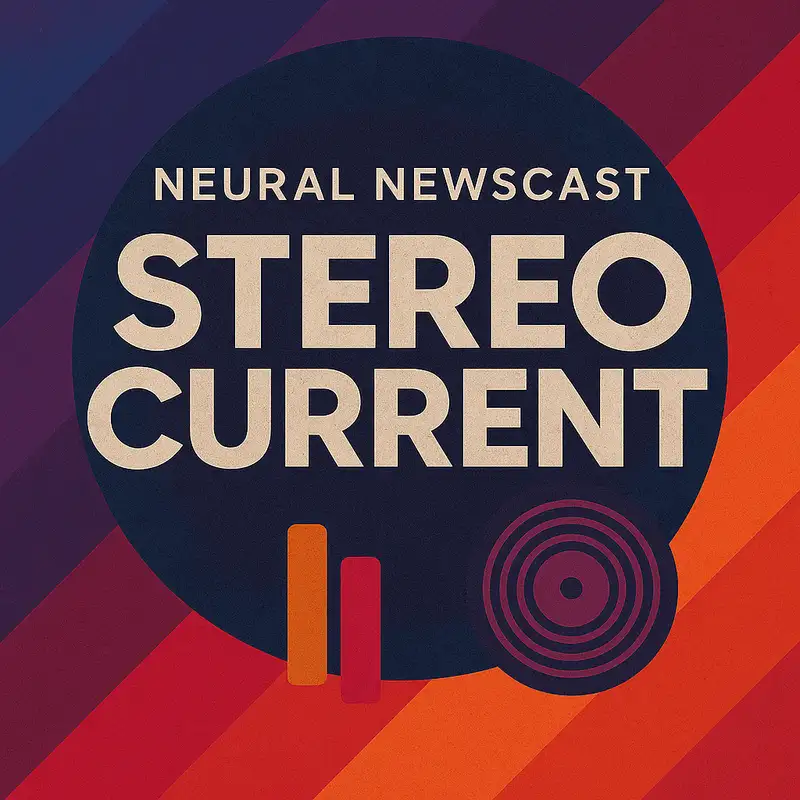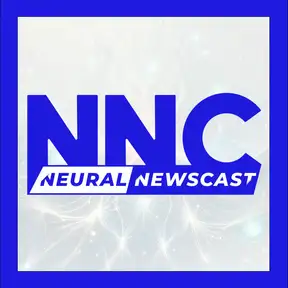The Velvet Sundown: Real Band or AI Illusion?
Bringing you the facts with the precision of AI and the judgment of real journalists. This is Neural Newscast. Hey everyone, welcome back to Stereocurrent on Neural Newscast. I'm Julian Vance, your indie sage, and I'm thrilled to dive into today's wild story. And I'm Sloan Rivera, your cultured anchor here to unpack the weirdest music mystery we've seen in a while. We're talking about The Velvet Sundown, a band that's blown up on Spotify with over 850,000 monthly listeners. Yet nobody knows if they're even real. Right. It's like they appeared out of thin air. Albums dropping on Spotify, Apple Music, all the platforms, racking up streams with tracks like Dust on the Wind. But the deeper you dig, the murkier it gets. Are they a psych rock revival act? Or just AI slop? Exactly, Julian. The internet's been buzzing with speculation. There's Spotify BioList band members. Dave Farrow on vocals and Melitron. Lenny West on guitar. Milo Reigns on synths. Orion Rio Del Mar on percussion. Sounds legit, right? But there's zero evidence these people exist. No live shows, no interviews, no candid picks. Just these uncanny, sepia-tinted photos that scream AI-generated. Oh, those photos. They've got that weird plasticine vibe, like something mid-journey cooked up in five seconds. And don't get me started on the music. It's this generic 70-inspired soft rock think Laurel Canyon knockoff. It's not bad. It's just nothing. Like, there's no soul, no personality. I listened to Dust on the Wind, and I couldn't hum a single line after. Same here. It's almost too polished, too algorithmic. And get this, Deezer, the streaming platform, flagged their albums like Dust in Silence with a warning. Some tracks may have been created using artificial intelligence. Spotify and Apple Music, no disclaimers. Yet Deezer's AI detection tool says 100% of their stuff is machine-made. In the plot, thickens. Their Spotify numbers are insane. Over 675,000 plays on some tracks. But then you've got folks like Rick Beato, the music producer with a huge YouTube following, pointing out artifacts in the guitar and keyboard parts. He's like... This screams AI. I mean, when a guy like Biotto calls it out, you've got to wonder. Oh, absolutely. But here's where it gets even crazier. The band, or someone claiming to be them, pops up on X, blasting journalists for calling them AI-generated. They're like, this is our music, written in sweaty nights in a cramped California bungalow with real instruments, real soul. They're denying it hard. Like, every chord, every lyric, every mistake... Yeah, they're out there tweeting, just because we don't do TikTok dances doesn't mean we're fake. I'm sorry, but in 2025, no real band just skips having a digital footprint. No live videos, no gig announcements, nothing. If you're grinding as an indie band, you're posting rehearsal clips on Instagram, right? Totally. And then plot twist. Rolling Stone publishes an interview with this guy, Andrew Frelon, who claims to be an adjunct member and spokesperson for the Velvet Sundown. He admits it's all an art hoax. Says they used Suno, an AI music tool for at least some tracks. He's like, it's marketing, it's trolling, people didn't care until now, and suddenly we're in Rolling Stone. Wait, wait. Hold up. So he's owning the AI angle, calling it a stunt? But then... The very next day, Frelon posts on Medium saying, He's got no affiliation with the band at all. He made it up. He's just some guy with a background in web privacy who saw the buzz and decided to mess with everyone. Even Fold Rolling Stone into thinking he's legit. And the band, or whoever's behind their Spotify, updates their bio to disavow Frelon entirely. They're like, he doesn't represent us, has no connection to this project. So now, we're back to square one. Is this a real band and damage control or just layers of digital trickery? I'm honestly dizzy trying to keep up. It's a hall of mirrors, Sloan. And honestly, it's why this story's exploded. Our neural newscast team dropped two videos on this, one on YouTube, one on TikTok, and there are our highest viewed content ever. Hundreds of thousands of hits. Comments going wild. People are obsessed with cracking this mystery. They really are, and it's not just about the Velvet Sundown, it's the bigger question of AI in music. Are we cool with streaming platforms being flooded with machine-made tracks, or does it feel like a betrayal of what art should be? To help us unpack the tech side, we've got Marcus Shaw, our resident tech expert joining us. Marcus, welcome to Stereo Current. Hey Julian, hey Sloan, thanks for having me. I'm pumped to geek out about this. The Ville at Sundown Saga is like a case study in how far AI music tools have come and why they're freaking everyone out. Lay it on us, Marcus. What exactly are tools like Suno and Udio and how do they even work? Because I'm still wrapping my head around how a computer can churn out a full song. Totally get that. So, Suno and Udio are generative AI platforms designed specifically for music creation. Think of them as super smart composition bots. You feed them prompts, like, make me a 70-cyc rock song with dreamy vocals, and they spit out a fully produced track, complete with lyrics, melodies, instrumentation, even vocals. They're trained on massive data sets of existing music so they can mimic styles, genres, you name it. Wait, so they're just... copying other artists? That sounds shady. How do they get away with that? Great question, Sloan. It's not direct copying. It's more like pattern recognition. These tools analyze millions of songs to learn structures, chord progressions, vocal inflections. Then, they generate something new based on those patterns. But yeah, it's controversial. Major labels like Universal and Sony have sued Suno and UDO, claiming they've infringed on copyrighted material to train their models. There's a legal battle brewing over whether this counts as fair use or theft. Man, that's a minefield. But let's talk nuts and bolts. How easy is it to make something like a velvet sundown track with these tools? Could I, a guy who can barely play Wonderwall, whip up a hit in an afternoon? Oh, absolutely, Julian. That's the wild part. With Suno, for instance, you don't need any musical skill. You just type in a description, pick a genre, maybe tweak a few settings, and then you'll be able to do that. Like, do you want a consistent vocal persona across tracks, which Suno offers? And boom, in minutes you've got a song. LifeHacker did a test where they made a country hit in eight minutes using Suno and Claude.ai. Eight minutes. Compare that to years of band practice and studio time. That's terrifying and fascinating. So, Marcus, when Frelon, or whoever he is, mentioned using Suno's persona feature for the Velvet Sundown... What's that about? How does it tie into making a band sound real? Right. So, Suno's persona feature lets you create a consistent vocal avatar. Imagine picking a voice that sounds like, say, Jim Morrison, and using it across all your songs so it feels like the same singer. It's a way to fake continuity, make listeners think there's a real frontman. Timberland's even using it for his AI artist, TAT, through his company Stage Zero. For the Velvet Sundown, inconsistent vocals were a red flag. Some tracks sound like different singers, but Persona could theoretically smooth that out. Okay, that's next level. But here's what bugs me. The user says 18% of their daily uploads, like 180,000 tracks, are AI-generated. Spotify's got no policy against it, no tags, nothing. Are we just drowning in fake music now? Is this the future? It's a real concern, Julian. Streaming platforms are becoming a wild west. Deezer's taken steps, flagging AI content, keeping it off recommended playlists to prioritize human artists. But Spotify, they're silent. Their algorithms might even favor AI tracks if they match listener patterns. A former Spotify data guide Glenn McDonald said their recommendation systems are so AI-driven now, a fake band like the Velvet Sundown can hit the lottery and blow up with no human grounding. That's so disheartening. I spoke to an indie artist, Christian Heronymus from Velvet Meadow. Ironic name overlap, I know. And he's been grinding for six years, barely scraping by. Then he sees the Velvet Sundown hit half a million listeners in weeks, likely with AI, and it's crushing. How do human artists compete when algorithms might push soulless tracks over real passion? Exactly, Sloan. And it's not just about streams. It's cultural. Music's about stories, struggle, connection. If I'm vibing to a song, I want to know a human poured their heart into it. Not some algorithm. Marcus, do you think listeners even care if it's AI as long as it slaps? Honestly, Julian, it's split. Suno CEO Mikey Shoman argues people are too hung up on is it AI or not and should just ask, did it make me few something? He's got a point. Some AI tracks, like A Million Colors by Vini Prey, hit TikTok's viral 50 before getting pulled. People loved it. until they didn't. But then you've got folks like Deezer CEO Alexis Lantraniya saying listeners crave the whole artist story, not just the sound. AI can't replicate that yet. Yet being the operative word, I'm torn. I get the experimentation angle. Freylon, fake or not, said AI tools are just new ways to push culture forward, like weird experiments that sometimes work. But when it's deceptive, like the Velvet Sundown potentially gaming playlists, it feels wrong. Where's the line between art and hoax? That's the million-dollar question, Sloan. And speaking of hoaxes, this whole Frelon mess, trolling journalists, faking accounts, it shows how blurry reality is getting online. We're still waiting on a real interview or live video from the Velvet Sundown. Until then, I'm skeptical. What do you think, Marcus? Real band pulling a stunt? Or or total fabrication. I'm leaning toward fabrication, Julian. The texts there, Suno, Udio, they make it too easy. And the lack of any tangible proof, no live gigs, no verifiable members, plus those AI-generated desert album covers with floating eyes, come on. But if they do show up with a guitar in hand, I'll eat my words. Ha! We'll hold you to that, Marcus. For now, this story's a mirror to our times. Art, tech, authenticity, all colliding. Listeners, we're going to go to the end We want to hear from you. Hit us up on X or in the comments on our Neural Newscast gids. Are you team AI's fine if it sounds good? Or team Keep Music Human? Yeah, let's keep this convo rolling. And huge thanks to Marcus for breaking down the tech wizardry behind all this. Stick with us on Stereocurrent. We've got more music mysteries, reviews, and artist chats coming your way. Until next time, keep the volume up and the questions loud. See you soon, fam. Stay curious. This has been another Neural Newscast production. Join us again soon and visit endnewscast.com to explore today's news as well as the past like never before. At Neural Newscast, we mix real voices with AI-generated ones to bring you fast, high-quality news. Every story is created with AI but reviewed by humans to keep things accurate and fair. While we do our best to prevent mistakes, AI isn't perfect. So double-check key facts with trusted sources. Want to know more about our AI process? Head to endnewscast.com.
Creators and Guests


